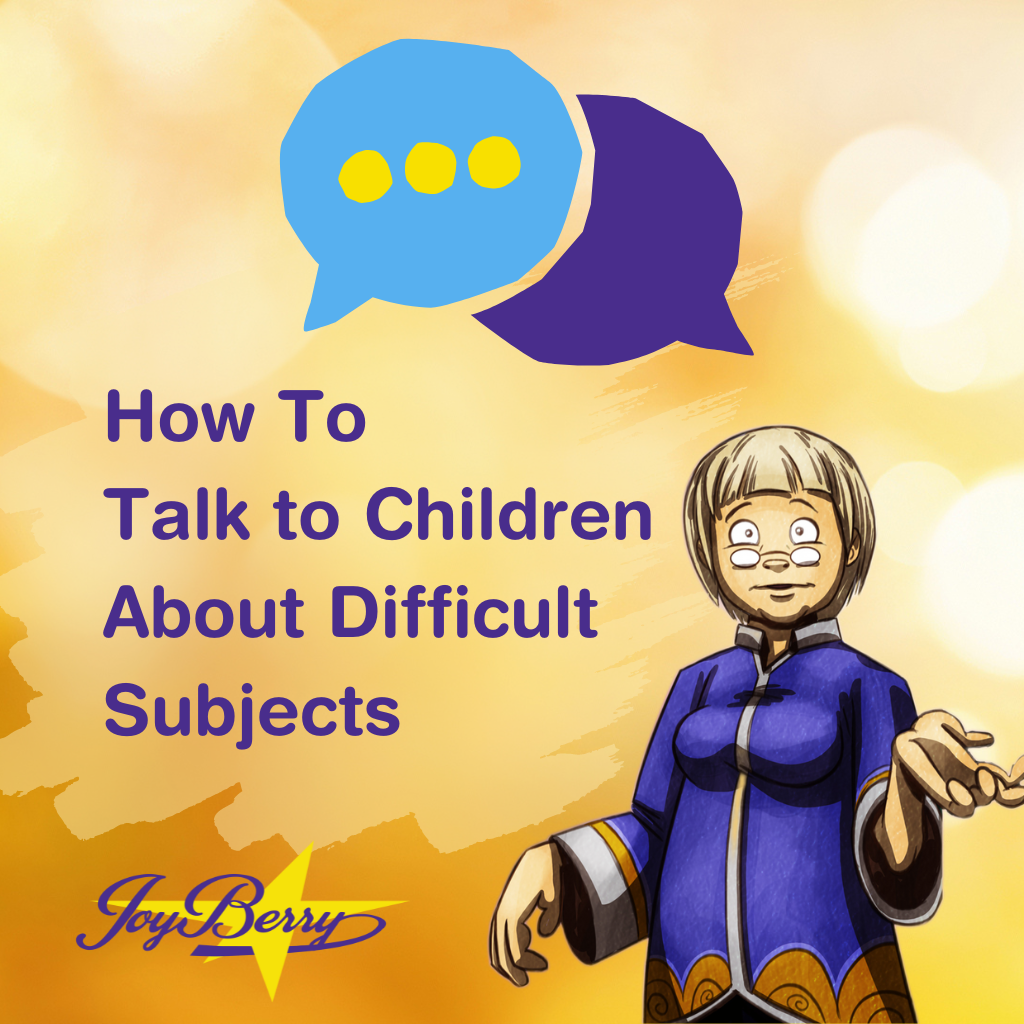The Official Joy Berry Website
The Official Joy Berry Website
Helping Kids Help Themselves
become responsible, happy, and successful
Parents looking for books for 10 year olds are often looking for resources that can provide guidelines for talking with kids about difficult subjects.
Last week, a school principal lamented to me, “It used to be that the main controversy we had to deal with was when and how to teach kids about the ‘birds and the bees.’ Now its sexual identity, guns, climate change, cyberbullying, CRT and so much more.”
In the not-too-distant-past, if kids didn’t bring it up, it meant they didn’t know or care about it. But long gone are the days in which parents could stick their head in the sand. Given the inescapable onslaught of media bombardment and the loud discourse that it generates, here is my best and simplest advice regarding How to Talk with Kids about Difficult Subjects
STEP ONE – Identify the specific difficult subject your child might be exposed to and determine whether or not the subject might impact your child in any way.
STEP TWO – Research the difficult subject. Identify the words or terms associated with the difficult subject and find out their meanings.
STEP THREE – Be on the lookout for any sign that your child might have been exposed to, or has an interest in, the difficult subject.
STEP FOUR – Respond to any sign that your child might have been exposed to, or has an interest in, the difficult subject. Ask sincerely and without judgment, “What do you know about (the difficult subject)? What do you think about it?”
STEP FIVE – Offer to talk with your child about the difficult subject or refer your child to a trusted advisor to have a conversation about it. Also make available to your child any valid research you have garnered about the difficult subject.
STEP SIX – Encourage your child to reach out to you if and when your child wishes to discuss the difficult subject further. Assure your child that any conversation will happen without judgment or punitive consequences.
Remember that, according to The Convention on the Rights of the Child, (explained to kids in my graphic novel (The Junkroom Band’s Gig Goes Global), kids have the right to think their own thoughts and believe their own beliefs. This mean that your child’s thoughts about a difficult subject need to be respected.
In the event your child’s thoughts about a difficult subject do not align with yours, make certain your beliefs about the subject are based on solid information and facts and are not merely beliefs that have been blindly handed down from generation to generation. Once you are certain that a belief has a solid foundation, live it to the best of your ability. If you do this, the odds are in your favor that your child will follow your lead.

Copyright © 2024 Joy Berry Enterprises. All Rights Reserved.
| Cookie | Duration | Description |
|---|---|---|
| cookielawinfo-checkbox-analytics | 11 months | This cookie is set by GDPR Cookie Consent plugin. The cookie is used to store the user consent for the cookies in the category "Analytics". |
| cookielawinfo-checkbox-functional | 11 months | The cookie is set by GDPR cookie consent to record the user consent for the cookies in the category "Functional". |
| cookielawinfo-checkbox-necessary | 11 months | This cookie is set by GDPR Cookie Consent plugin. The cookies is used to store the user consent for the cookies in the category "Necessary". |
| cookielawinfo-checkbox-others | 11 months | This cookie is set by GDPR Cookie Consent plugin. The cookie is used to store the user consent for the cookies in the category "Other. |
| cookielawinfo-checkbox-performance | 11 months | This cookie is set by GDPR Cookie Consent plugin. The cookie is used to store the user consent for the cookies in the category "Performance". |
| viewed_cookie_policy | 11 months | The cookie is set by the GDPR Cookie Consent plugin and is used to store whether or not user has consented to the use of cookies. It does not store any personal data. |

Leave a reply